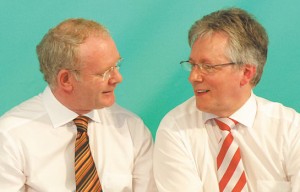Una pubblicità radiofonica che promuove l’Accordo di Hillsborough Castle potrebbe essere ritirata dall’etere qualora le stazioni non avessero la necessaria autorizzazione

Il regolatore, Ofcom, ha iniziato un’indagine dopo la denuncia del TUV, secondo cui la pubblicità infrangerebbe la legge.
Ofcom afferma che le emittenti non dovrebbero trasmetter la pubblicità senza l’autorizzazione.
Un portavoce dell’organismo di controllo ha spiegato come in base al Radio Advertising Standards Code (Codice Normativo sulla Pubblicità Radiofonica), “speciali categorie” di pubblicità “devono essere autorizzate” dal Radio Advertising Clearance Centre prima di essere messe in onda.
Le categorie speciali includono “questioni politiche, industriali e pubbliche controverse” e le campagne governative.
Pericolo elettorale
“Prima di qualsiasi decisione di Ofcom su questa pubblicità, abbiamo ricordato alle maggiori stazioni radio che, senza aver ottenuto l’autorizzazione alla trasmissione dell’annuncio, on possono continuare a far ascoltare la pubblicità”, ha affermato.
Non è chiaro quante stazioni radio commerciali abbiano richiesto l’autorizzazione dal Radio Advertising Clearance Centre.
Il leader del TUV, Jim Allister, si è lamentato che la campagna pubblicitaria era “solo un semplice sfoggio di vanità” da parte dei due maggiori partiti nordirlandesi, mentre Mark Durkan dello SDLP a detto che la pubblicità giunge “pericolosamente vicino” alle elezioni in nome del DUP e Sinn Fein.
Ofcom ha affermato che rilascerà la sua decisione finale sulla pubblicità quando sarà completata l’indagine.
Tratto da BBC News
Agreement radio adverts may be pulled from airwaves
A radio advertisement promoting the Hillsborough Agreement may have to be pulled from the airwaves in cases where stations have not obtained clearance.
The regulator, Ofcom, has begun an investigation after the TUV complained the advert breached advertising law.
Ofcom said broadcasters should not transmit the advert without clearance.
A spokesperson for the regulatory body explained that under the Radio Advertising Standards Code, “special categories” of advertisements “must be cleared centrally” by the Radio Advertising Clearance Centre before they can be broadcast.
He added that special categories include “political, industrial and public controversy matters” and government campaigns.
Electioneering danger
“In advance of any Ofcom decision on this advertisement, we have reminded the relevant broadcasters that, unless they have obtained central clearance for the advertisement before its transmission, they should not continue to broadcast the advertisement,” he said.
It is not yet clear how many commercial radio stations sought prior clearance from the Radio Advertising Clearance Centre.
The TUV leader, Jim Allister, complained that the advertising campaign was “a mere vanity stunt” on behalf of two largest parties in Northern Ireland, while the SDLP’s Mark Durkan said the advert came “dangerously close” to electioneering on behalf of the DUP and Sinn Fein.
Ofcom said it would publish its final decision on the advert when it had completed its investigation.